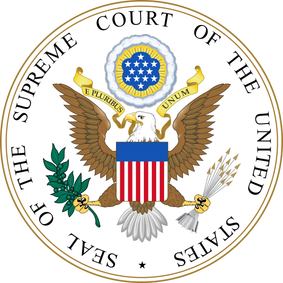
http://aclu-or.org/content/moss-v-secret-service?etname=OR_update_032614&etjid=1341362
Washington D.C. - The Supreme Court heard oral argument today in Wood v. Moss, a case brought by us on behalf of a multi-generational group of peaceful protesters, who were forcibly moved on orders of the Secret Service to a place where their protests could no longer be seen or heard by President Bush. The protest took place during a visit to Jacksonville, Oregon in 2004. Demonstrators supporting the President were allowed to remain much closer to him.
The lawsuit claims that the protesters were targeted because of their political views in violation of their free speech rights.
“The Secret Service does not have immunity from the First Amendment,” said Steven M. Wilker, a lawyer with Tonkon Torp LLP in Portland, who argued the case as a cooperating attorney for the ACLU.
Plaintiffs supported their claim of viewpoint discrimination by alleging that they were treated less favorably that Bush supporters, that the decision to move them was not made until after the President sat down to dinner and could hear their chants, and was consistent with at least 12 similar incidents during the first Bush administration. In addition, the decision was also consistent with the Bush White House Advance Manual which instructed the President’s staff to “work with the Secret Service” to ensure that protesters were kept far away from the President’s view and hearing.
Nevertheless, the Justice Department has asked the Supreme Court to dismiss the case on the ground that plaintiffs’ claim of viewpoint discrimination is “implausible.” Defendants also argue that Secret Service agents could not have been expected to know in 2004 that their actions in this case violated the First Amendment even if plaintiffs’ allegations are accepted as true.
Both arguments were rejected by the United States Court of Appeals for the Ninth Circuit in a 2012 ruling.
“The job of the Secret Service is to shield the president from danger, not from criticism,” said Steven R. Shapiro, the national legal director of the ACLU.
The initial complaint in this case was filed in 2006 and there have been two appeals of lower court decisions to deny the federal government’s motions to dismiss the case. If plaintiffs prevail in the Supreme Court, the case will finally proceed to discovery and trial.
“The right to engage in peaceful political protest lies at the very heart of the First Amendment,” said David Fidanque, executive director of the ACLU of Oregon. “The government essentially is arguing that the courts should trust the Secret Service agents based on faith, rather than evidence. Our clients are entitled to have the case go forward so that they can finally have their day in court.”
SCOTUS---Court Upholds Property Rights in Rails-to-Trails Case
SCOTUS----Amazon workers' suit for paid search waits
SCOTUS---Rejects Appeal of Victim Disarmament Legislation
SCOTUS---Did EPA Overstep on Global Warming
SCOTUS---Court grants reprieve to death row inmate over pentobarbital
SCOTUS---Case on Obama Recess Appointments
SCOTUS---Interstate Pollution Case
SCOTUS---The Supremes decline illegal NSA phone spying case
SCOTUS---The Supreme Court lets Oklahoma abortion law fail
SCOTUS---Narrow ruling in Michigan affirmative action case expected
SCOTUS---Anti-prostitution pledge in AIDS law violates free speech
SCOTUS---U.S. top court bars patents on human genes unless synthetic
SCOTUS---Supreme Court Allows Warrantless Collection of DNA by Police/5-4 Ruling
SCOTUS---The American Police State
SCOTUS showdown over Voting Rights Act
SCOTUS---Farmer vs. Monsanto
SCOTUS---Dog's sniff was up to snuff

 RSS Feed
RSS Feed
